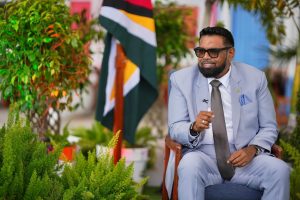UN Secretary General hails prevention of Guyana/Venezuela conflict

United Nations Secretary General António Guterres has hailed the Caribbean and Latin American region as a zone of peace and Thursday took note of the avoidance of conflict between Guyana and Venezuela.
“The first tribute is to Latin America and the Caribbean as a continent of peace, in a world where we see a proliferation of wars and conflicts of all kinds,” Guterres said on his arrival in St Vincent and the Grenadines for the summit Community of Latin American and Caribbean States (CELAC).
President Irfaan Ali is attending the summit and Venezuela President Nicolas Maduro is also expected to attend.
It was in St Vincent last December when Venezuela backed away from its threat of using force to annex the Essequibo region, and Guyana agreed, though never using force, to reciprocate.
The meeting was hosted by St Vincent’s Prime Minister Ralph Gonsalves and was attended by several leaders of the Caribbean Community (CARICOM).
The UN Secretary General pointed to the role of mediation “when a problem arises”, such as the one with “two neighbours, Guyana and Venezuela”.
“…there is a mediator that emerges and is able to bring the parties together and to avoid a conflict,” he stated.
He paid tribute to Prime Minister Gonsalves for “his permanent role, always very attentive to any possibility of conflict, and his engaged, active and effective mediation.”
Roosevelt Skerrit, Prime Minister of Dominica, and chair of CARICOM when the peace deal was brokered, last Sunday evening described the moment as a template for others in the world to follow.
“We made international news, not for unrest, war of violence but for hosting of mature, proactive deliberations that created a template that others in the world would do well to follow,” Skerrit stated at the opening of the 46th Regular Meeting of CARICOM at the National Cultural Centre in Georgetown.
The border between Guyana and Venezuela was settled by an arbitral tribunal on October 3, 1899, but on the even of Guyana’s independence in 1966, Venezuela repudiated the award which it had upheld for more than 60 years.
Decades of talks failed to settle the controversy and the United Nations Secretary General, in keeping with an agreement in Geneva which Venezuela signed on to, referred the matter to the International Court of Justice.
In provisional measures granted last December, the Court ruled that Guyana has governed and exercised sovereignty over the 83,000 square miles determined as its territory in 1899, and that should not change unless the court determines otherwise in its ultimate ruling.
Guyana is one of the founding members of CARICOM, establishing the body in 1973 with Barbados, Trinidad and Jamaica.
CARICOM has grown to include 11 other countries, with the last being Haiti. There are also five associate member nations.
CARICOM has supported Guyana in the controversy with Venezuela.
At their Heads of Government meeting – the grouping’s highest decision making body – acknowledged the overwhelming decision of the Court of 6 April 2023 to reject Venezuela’s Preliminary Objection which sought to make the United Kingdom an indispensable party to the proceedings. They further noted the Court’s decision that, in keeping with the provisions of the 1966 Geneva Agreement, it had jurisdiction to adjudicate on the merits of Guyana’s claim regarding the validity of the 1899 Arbitral Award that had determined the boundary between British Guiana and Venezuela.
The Heads of Government reiterated their “continued support for the judicial process and the security, maintenance and preservation of the sovereignty and territorial integrity of Guyana.”









